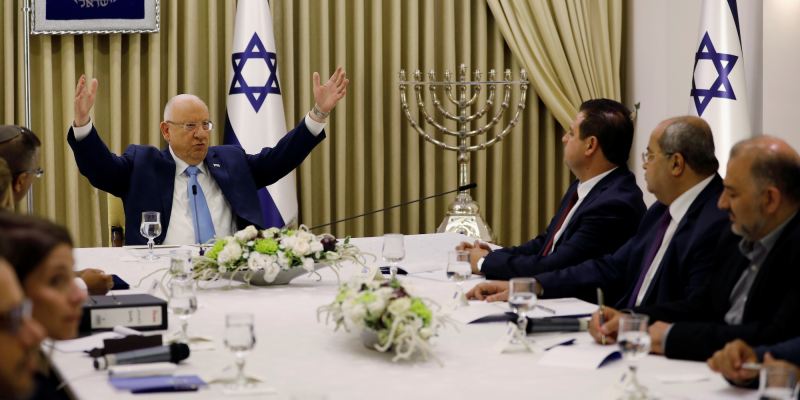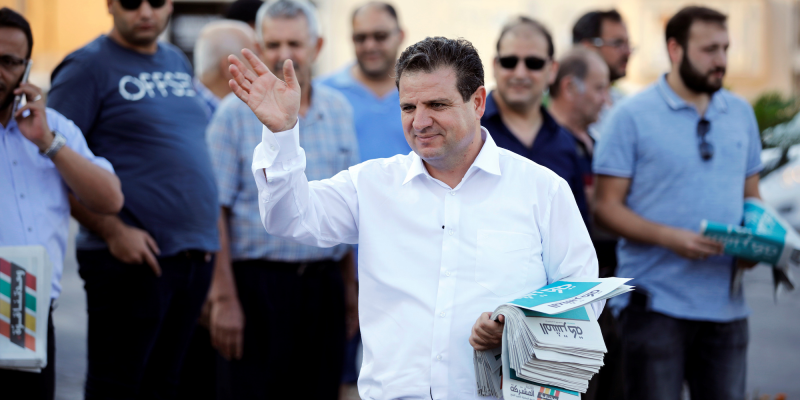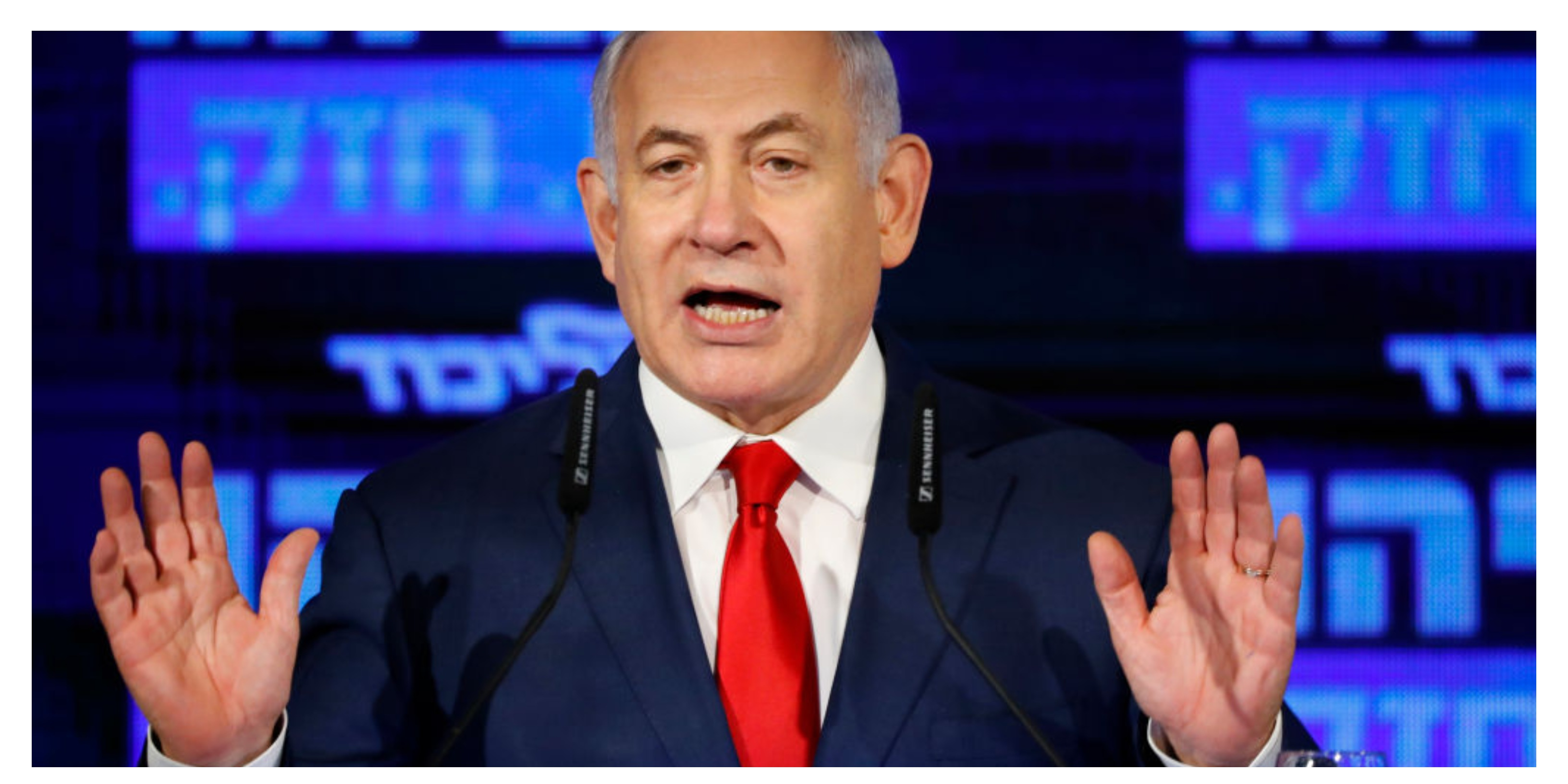- Israel voted September 17 in an election that put the future of its longtime prime minister, Benjamin Netanyahu, at stake.
- Netanyahu, of the right-wing Likud party, faced off against Benny Gantz, the Blue and White party leader who was previously the Israel Defense Forces military chief, for the second time this year.
- Final results indicate that the centrist Blue and White Party has won 33 seats in the Knesset, overtaking the Likud party, which won 32 seats.
- Though Gantz has won slightly more seats in Israel’s parliament than Netanyahu, he appears to not have the support of smaller parties needed to secure a win.
- Neither party has won an outright majority – which means President Reuven Rivlin has been left to choose a winner based on discussions with small parties on whom they endorse to lead the country.
- So far, Netanyahu’s endorsements put him at 55 seats. Gantz’s endorsements put him at 54 seats.
- In a surprise move, Rivlin has chosen Netanyahu to work toward cobbling together a government. But time is running out for Netanyahu, who is facing several corruption scandals and may face criminal charges in the near future.
- Visit Business Insider’s homepage for more stories.
Israel voted September 17 in elections meant to decide the future of Prime Minister Benjamin Netanyahu, pitting a major ally of US President Donald Trump against a former top Israeli military chief.
If this feels familiar, it is.
Israel previously had an election just five months ago, after Netanyahu’s government dissolved over clashes with his coalition partners. Early elections were called for April 9.
Netanyahu faced off against Benny Gantz, a 60-year-old who served as the head of the Israel Defense Forces from 2011 to 2015, navigating the country through two incursions on the Gaza Strip.
Gantz leads the centrist Blue and White party, which was formed only this year.
Many voters have voiced support for Gantz, who would undeniably bring change after Netanyahu's four terms and 13 years as prime minister. Netanyahu heads the right-wing Likud party.
He is the longest-serving leader in Israel's history.
Back in April, both Netanyahu and Gantz won 35 seats in Israel's parliament, far short of the 61 needed for an outright majority. (Israel's parliament, called the Knesset, has 120 seats.)
When no party wins a majority, the Israeli president - currently Reuven Rivlin - picks a prime minister based on who is considered most able to form a governing coalition. In April, Rivlin chose Netanyahu, who then failed to form a coalition government. The consequence was the September election.

Netanyahu has been selected to form a government - but it doesn't mean he's in the clear
Though Israelis are reliving an experience they went through just months ago, voter turnout this election was higher than April's, up to 69.4% from 67.9%.
Final results indicate that Gantz's Blue and White party has won 33 seats in the Knesset, overtaking Netanyahu's Likud party, which won 32 seats.
Third parties, soon to become strategic allies to chosen candidate, held smaller yet significant portions of the vote.
Most notably, the Arab Joint List came in as the third-largest party, winning 10.62% of the vote, equal to 13 seats.
Because no party has secured a majority, Rivlin on Wednesday evening selected Netanyahu to form a government based on discussions with smaller parties on who they endorsed to lead the country. He now has 28 days to form a coalition government.
Netanyahu's endorsements put him at 55 seats, narrowly inching ahead of Gantz, whose recommendations place him at 54 seats. He now needs 61 seats to secure a victory.
Gantz was endorsed by Arab party lawmakers on Sunday, a shock move given that Arab-led parties have not put forward a recommendation for who should lead the government since 1992. But Netanyahu's strong support with the right-wing and religious parties edged him slightly ahead.

If Netanyahu can't form a coalition, another candidate will be given a chance, or the country will be thrust into yet another round of early elections that would be unfavorable to all parties involved.
Netanyahu has called for a power-sharing agreement between the two largest parties, but Gantz has sternly refused to join a government with Netanyahu, who is embroiled in several corruption scandals.
Netanyahu's future now hangs in the balance, as pretrial hearings are scheduled to begin next week. If Netanyahu can figure out a way to remain in power, he would not be required to step down even in the event of an indictment. If he cannot muster up a successful coalition, he may face criminal charges in the near future.
Earlier this week, Netanyahu and Gantz met with Rivlin to discuss prospects of a unity government, a reference to a possible joint rule between his party and Netanyahu's Likud.
During their meeting, Rivlin said the two party leaders made "significant steps" in negotiations, though neither could agree on who would serve first in a rotating leadership.
Gantz initially called for a "good and desirable unity government," but he swiftly rejected Netanyahu's concessions and instead called on Netanyahu's religious allies to dump their coalition agreements with Likud.
"I intend to form a broad and liberal unity government under my leadership," Gantz said at a news conference Thursday.
Avigdor Liberman, the leader of the Yisrael Beiteinu party - a kingmaker in the previous election who has won a crucial eight seats that could sway either candidate to victory - has so far refused to endorse either party.
If Netanyahu cannot persuade Gantz to form a unity government alongside him, or cannot convince other parties to give him the extra endorsements he needs to reach 61 seats, he will lose his chance at power.

